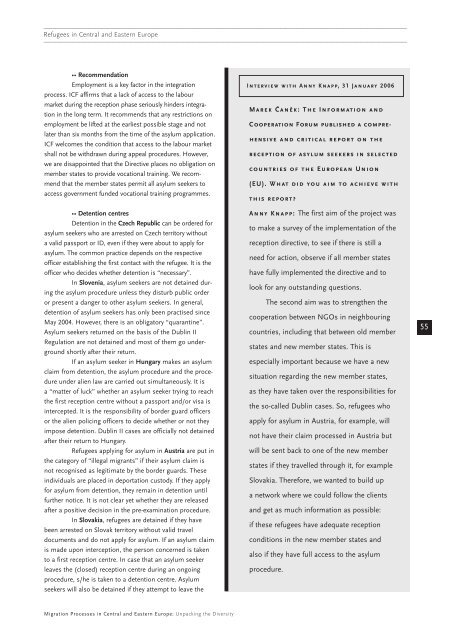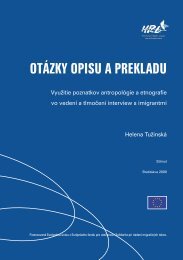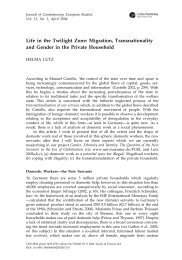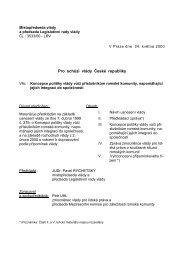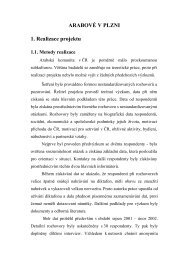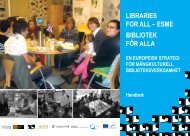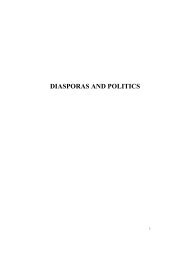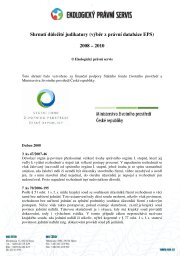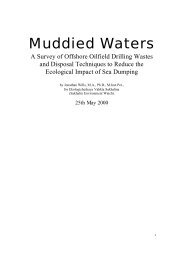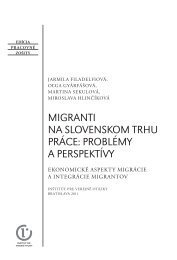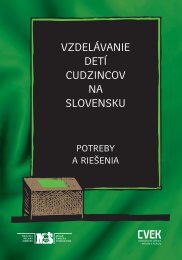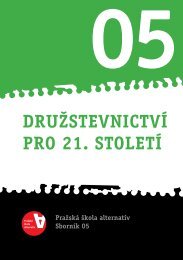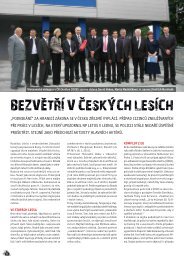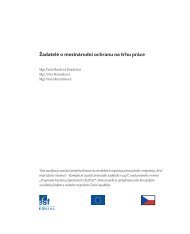Migration Processes in Central and Eastern Europe - Multiple Choices
Migration Processes in Central and Eastern Europe - Multiple Choices
Migration Processes in Central and Eastern Europe - Multiple Choices
Create successful ePaper yourself
Turn your PDF publications into a flip-book with our unique Google optimized e-Paper software.
———————————————————————————————————————————————————————————————<br />
Refugees <strong>in</strong> <strong>Central</strong> <strong>and</strong> <strong>Eastern</strong> <strong>Europe</strong><br />
———————————————————————————————————————————————————————————————<br />
•• Recommendation<br />
Employment is a key factor <strong>in</strong> the <strong>in</strong>tegration<br />
process. ICF affirms that a lack of access to the labour<br />
market dur<strong>in</strong>g the reception phase seriously h<strong>in</strong>ders <strong>in</strong>tegration<br />
<strong>in</strong> the long term. It recommends that any restrictions on<br />
employment be lifted at the earliest possible stage <strong>and</strong> not<br />
later than six months from the time of the asylum application.<br />
ICF welcomes the condition that access to the labour market<br />
shall not be withdrawn dur<strong>in</strong>g appeal procedures. However,<br />
we are disappo<strong>in</strong>ted that the Directive places no obligation on<br />
member states to provide vocational tra<strong>in</strong><strong>in</strong>g. We recommend<br />
that the member states permit all asylum seekers to<br />
access government funded vocational tra<strong>in</strong><strong>in</strong>g programmes.<br />
•• Detention centres<br />
Detention <strong>in</strong> the Czech Republic can be ordered for<br />
asylum seekers who are arrested on Czech territory without<br />
a valid passport or ID, even if they were about to apply for<br />
asylum. The common practice depends on the respective<br />
officer establish<strong>in</strong>g the first contact with the refugee. It is the<br />
officer who decides whether detention is “necessary”.<br />
In Slovenia, asylum seekers are not deta<strong>in</strong>ed dur<strong>in</strong>g<br />
the asylum procedure unless they disturb public order<br />
or present a danger to other asylum seekers. In general,<br />
detention of asylum seekers has only been practised s<strong>in</strong>ce<br />
May 2004. However, there is an obligatory “quarant<strong>in</strong>e”.<br />
Asylum seekers returned on the basis of the Dubl<strong>in</strong> II<br />
Regulation are not deta<strong>in</strong>ed <strong>and</strong> most of them go underground<br />
shortly after their return.<br />
If an asylum seeker <strong>in</strong> Hungary makes an asylum<br />
claim from detention, the asylum procedure <strong>and</strong> the procedure<br />
under alien law are carried out simultaneously. It is<br />
a “matter of luck” whether an asylum seeker try<strong>in</strong>g to reach<br />
the first reception centre without a passport <strong>and</strong>/or visa is<br />
<strong>in</strong>tercepted. It is the responsibility of border guard officers<br />
or the alien polic<strong>in</strong>g officers to decide whether or not they<br />
impose detention. Dubl<strong>in</strong> II cases are officially not deta<strong>in</strong>ed<br />
after their return to Hungary.<br />
Refugees apply<strong>in</strong>g for asylum <strong>in</strong> Austria are put <strong>in</strong><br />
the category of “illegal migrants” if their asylum claim is<br />
not recognised as legitimate by the border guards. These<br />
<strong>in</strong>dividuals are placed <strong>in</strong> deportation custody. If they apply<br />
for asylum from detention, they rema<strong>in</strong> <strong>in</strong> detention until<br />
further notice. It is not clear yet whether they are released<br />
after a positive decision <strong>in</strong> the pre-exam<strong>in</strong>ation procedure.<br />
In Slovakia, refugees are deta<strong>in</strong>ed if they have<br />
been arrested on Slovak territory without valid travel<br />
documents <strong>and</strong> do not apply for asylum. If an asylum claim<br />
is made upon <strong>in</strong>terception, the person concerned is taken<br />
to a first reception centre. In case that an asylum seeker<br />
leaves the (closed) reception centre dur<strong>in</strong>g an ongo<strong>in</strong>g<br />
procedure, s/he is taken to a detention centre. Asylum<br />
seekers will also be deta<strong>in</strong>ed if they attempt to leave the<br />
Interview with Anny Knapp, 31 January 2006<br />
Marek Čaněk: The Information <strong>and</strong><br />
Cooperation Forum published a comprehensive<br />
<strong>and</strong> critical report on the<br />
reception of asylum seekers <strong>in</strong> selected<br />
countries of the <strong>Europe</strong>an Union<br />
(EU). What did you aim to achieve with<br />
this report?<br />
Anny Knapp: The first aim of the project was<br />
to make a survey of the implementation of the<br />
reception directive, to see if there is still a<br />
need for action, observe if all member states<br />
have fully implemented the directive <strong>and</strong> to<br />
look for any outst<strong>and</strong><strong>in</strong>g questions.<br />
The second aim was to strengthen the<br />
cooperation between NGOs <strong>in</strong> neighbour<strong>in</strong>g<br />
countries, <strong>in</strong>clud<strong>in</strong>g that between old member<br />
states <strong>and</strong> new member states. This is<br />
especially important because we have a new<br />
situation regard<strong>in</strong>g the new member states,<br />
as they have taken over the responsibilities for<br />
the so-called Dubl<strong>in</strong> cases. So, refugees who<br />
apply for asylum <strong>in</strong> Austria, for example, will<br />
not have their claim processed <strong>in</strong> Austria but<br />
will be sent back to one of the new member<br />
states if they travelled through it, for example<br />
Slovakia. Therefore, we wanted to build up<br />
a network where we could follow the clients<br />
<strong>and</strong> get as much <strong>in</strong>formation as possible:<br />
if these refugees have adequate reception<br />
conditions <strong>in</strong> the new member states <strong>and</strong><br />
also if they have full access to the asylum<br />
procedure.<br />
55<br />
<strong>Migration</strong> <strong>Processes</strong> <strong>in</strong> <strong>Central</strong> <strong>and</strong> <strong>Eastern</strong> <strong>Europe</strong>: Unpack<strong>in</strong>g the Diversity


